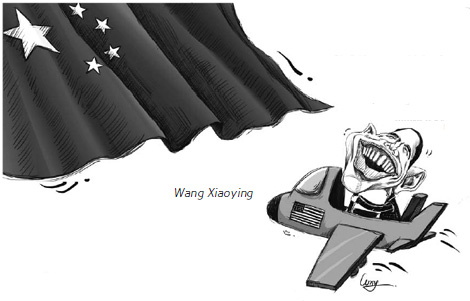Obama carries burden of expectations on first visit

US President Barack Obama's visit to China from Nov 15 carries high hopes for Chinese as well as Americans. Obama has already held several meetings with President Hu Jintao on the sidelines of international summits. The two heads of state have agreed, too, to make joint efforts to build "positive, cooperative and comprehensive Sino-US relations in the 21st century" and strengthen dialogue by setting up the Strategic and Economic Dialogue (SAED) mechanism, something that the George W. Bush administration had refused to do.
This good beginning is expected to culminate in the consolidation of bilateral ties when Obama flies to Beijing after attending an informal meeting of Asia-Pacific Economic Cooperation (APEC) leaders.
Given the current international situation, the direction and stability of Sino-US ties will not only determine the future of the two countries, but also greatly influence global patterns.
Bush did make some contributions to the smooth development of Sino-US ties during the later period of his presidency by upgrading bilateral ties from "strategic competition" to "stakeholder" and "constructive partnership". And now, Obama, riding the wave of "change", has said his "new deal" will change the tenor of US foreign policy.
The US president has reiterated that Sino-American relations are the most important bilateral ties in the world and attended the first SAED to prove his point. He said China and the US both have to shoulder vital international responsibilities and that Washington is trying to establish "more vigorous ties" with Beijing to resolve global issues.
One of the welcome changes in the US stance, as Obama said, is that the most intractable challenge for America will not come from China. And the US will exercise self-restraint and prudence over some sensitive issues of common concern. Some US higher officials, too, have highlighted the bright future of bilateral ties on different occasions.

These words and actions, helpful in cementing Sino-US relations and expanding cooperation, deserve applause. But what Chinese have difficulty in understanding is that if the US is eager to maintain good ties with China, why does Washington continue to sell arms to Taiwan? Why does it continue to appoint "special coordinators for Tibetan issues"? Why doesn't it recognize China as a full market economy even after granting that status to Russia?
Moreover, why does US National Intelligence Strategy 2009 identify China as a "global challenger" (on par with the so-called "axis of evil") to US interests? Why did Secretary of Defense Robert Gates say China's ever-advancing arms would create "new threat" to the US army and weaken its military power in the Pacific region?These questions show that the Obama administration's China policy, like that of its predecessor's, has double standards.
Recently, I attended a "global forum" held by Georgetown University's Law School in Beijing, where some negative aspects of US foreign policy toward China were raised. Robert Goldberg, deputy chief of mission of the US embassy in Beijing, delivered a speech, saying expectations from Sino-US relationship were high. Referring to the problems facing the two countries, he said in Chinese: "As the Chinese saying goes, we should seek common ground while reserving differences." His words are food for thought.
It was former Premier Zhou Enlai who first used the expression, to "seek common ground while reserving differences". Addressing the Bandung Conference 54 years ago, he declared that "harmony is precious", and went on to integrate the necessity to "seek common ground while reserving differences" with the Five Principles of Peaceful Coexistence, which was applauded by the entire world.
Now the US has learned to "seek common ground while reserving differences". But if the US demands that China cooperate only in areas that it needs it to, and to disregard or even infringe upon China's core interests, then how can the two countries reach common ground? If the two countries can genuinely seek common ground, respect each other's interests, especially core interests, and join hands in pursuing mutually benefiting goals, they will set a good example for the rest of the world.
There is no need to evade or deny the long existing differences or conflicts between China and the US in terms of ideology, social systems and some core interests. In a multipolar world, whose main themes are peace and development, the interdependence of China and the US has deepened in many fields. China certainly needs the cooperation of the US - the same is true vice versa. In fact, the US cannot fulfill many of its goals without China's help.
Sino-US ties have progressed and acquired relative stability since Obama became the US president. And China can understand the problems Obama faces both at home and abroad. But if "Pax-Americana" becomes his established national policy, it could constrain or even dominate his foreign policy.
Obama's political philosophy and "new approach" diplomacy have tried to meet the demands of most Americans, suggesting he wants to be a statesman like Abraham Lincoln or Franklin D. Roosevelt.
He hopes, too, to make joint efforts with Hu to open new prospects for bilateral ties. Let's hope his visit elevates Sino-US relationship to a new high and the two countries find new ways to address the issues of financial crises, trade ties, climate change, hi-tech cooperation, counter-terrorism and nuclear nonproliferation.
The author is a Beijing-based researcher on international relations.
(China Daily 11/04/2009 page9)














